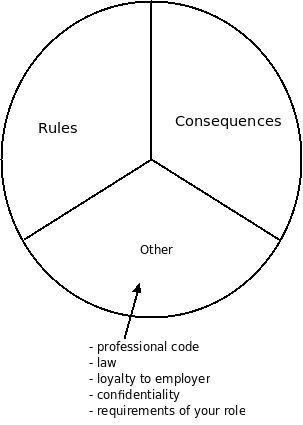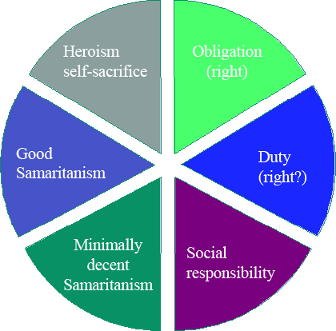Today's This week's lecture for SENG4921 - Professional Issues and Ethics was given by Stephen Cohen of the School of History and Philosophy, UNSW. The lecture title was “Theoretical Underpinnings of Ethics”.
It was a very interesting lecture for me, and I thought it was presented very well. You can find his lecture slides from last year here, and the audio here.
This post is basically a summary of the notes I made in the lecture, so you should be able to follow though the slides as its in chronological order. I've mixed in my own interpretation so it may not be the case that this is exactly what Cohen said and/or meant.
- Ethical thinking is about thinking of others interests.
- Everybody has the same ethical thinking, (and these are all important)
- Integrity
- Fairness
- Openness
- Compassion
- Honesty
Relativism is doing what the culture is doing just because everyone else is doing it. This is does not make it right. For example say you go to another country where bribery is common. This does not make it right. Nor does the line of thought "everyone else is doing it so it must be okay".
- People are too quick to play this relative card.
For example if you bump into a parked car and dent the other car's bumper your thinking here is focused on answering the question "What should I do?". However if for example you are asked to list some important moral characteristics your thinking here is focused on answering the question "What kind of person should I be?".
These two questions are the underpinnings of ethics.
You don't always end up doing what you think you should do.
"What kind of person should I be?" relates to a "Code of Ethics". This is what the employees or organisation are. "What should I do?" relates to a "Code of Conduct". This is what the employees or organisation should do.
When we talk about ethics we mean prescriptive ethics. This is what you should or ought to do, compared to descriptive ethic which is what people do do.
Morals and ethics are really the same.
Ethical is compared to (i.e. very different to)
- Prudential - self interest
- Political - settled by a vote (of opinion).
- Cohen used a good example, where one politician in parliament said they should have a referendum to see if the indigenous people should be given human rights. Another politician then got up and said this is non-negotiable. The indigenous people have a right to human rights, there should not be a referendum to decide this.
- Preference - want rather than should
- Artistic
To borrow a diagram from Cohen's slides,
Rules, consequences, professional code, law, loyalty to your employer, confidentiality, requirements of your role, etc. all factor into ethics.
Rules and consequences are requirements of morality of an individual (private morality), the other is public morality which comes into play when you occupy a role, it is mediated by the institution.
and another diagram,
I think this is the foundation of a lot of Cohen's message.
- Obligation - You are required to do something (e.g. you have signed in agreement to act on something)
- Duty - e.g. it is your duty to treat every human with respect
- Social Responsibility - Duty without a specific target. eg. ought to do something, whether it be Clean Up Australia, supporting Youth off the streets or the Red Cross, etc.
- Good Samaritanism - Go the extra mile. eg. stop to help someone with a flat tyre.
- Minimally Decent Samaritanism - eg. if you are wearing a watch and someone asks you for the time you tell them.
- Heroism Self-sacrifice - doing more than you have to do, beyond what is expected. eg. Wistleblowing
Cohen's advice, "be aware of these things".
"At work, you don't leave your private, personal values at the door!"
"Your ethical values must be there."
All these things often conflict, but you must make a decision. You may ask "Who's to judge" these things. The answer is always "You, as an individual." (from whatever perspective whether it be legal, ethical...)
I feel this is a key and important part of the lecture, and I know that this is not easy.
You have an obligation to your employer, at the same time you have your own ethics which may conflict. Would you do something you think is unethical just because you don't want to lose your job? I don't know what I would do...
Cohen makes another good example. Say there was a rule that said all motor vehicles must stop at a stop sign. But what about police who are chasing a criminal. What about an ambulance. What about people rushing someone injured to the hospital. As Cohen puts it, the right thing to do in all these cases is to run the stop sign. But we will continue to find more cases. The rules cannot cover them all.
The point he is trying to make is "you can't clear up ethics stuff with more rules." You need to make an ethical judgement.
I agree with this. Though this sounds like a tough legal issue. Who would be the judge of the ethical judgement? What if you broke the law in order to do what you thought was ethical? Would claiming you made an ethical judgement hold up in a litigation suite? I'm guessing not.
Another good example Cohen gave was the "dead man's break". As it was told State Rail implemented the dead man's break in it's trains, so if the driver got off the seat a break would be applied. The drivers didn't like this so some disabled it. As a result a train crashed because of this. So what did State Rail try to then do, they tried to make a fool-proof break. This doesn't work.
Whistleblowing - As Cohen puts it, the whistleblower almost always suffers. Its something that you are never obligated to do.
References:
Cohen, Stephen. Theoretical Underpinnings of Ethics. 2009. SENG4921 - Professional Issues and Ethics Lecture 1.

